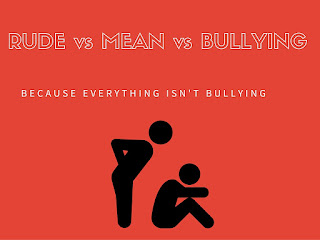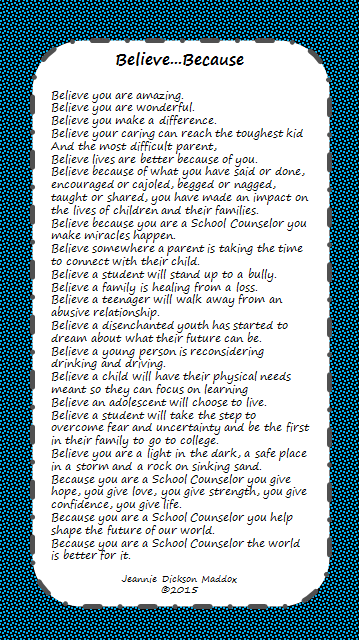I first heard Trish Hatch speak about 18 months ago. That day she rocked my School Counseling world and like a new convert, I have been trying to spread the word ever since. I saw her keynote at the FSCA conference, attended her break-out session, bought her book and have never looked back! That 45 minutes in the ballroom of an Orlando hotel forever changed my view of school counseling.
Even after the "high" of attending the conference and going back to the daily routine of my school day I was eager to make the miracle happen. I read Trish's book the
Use of Data in School Counseling, joined a weekly on-line book club that was studying her book, started experimenting with Google forms for data collection and passionately spoke to my PLC. My PLC is full of great counselors I am proud to call colleagues and friends, and they listened to me. However, I'm not sure they "got it," but I would guess that is because they had not had "the Trish experience!" In March 2015, I had the good fortune to see Trish again in Kentucky at the
Evidenced Based School Counseling Conference. After another riveting keynote, I was inspired to create the
21 Day Daily Data Challenge. The idea began to form as I listened to Trish talk about measuring just one thing. I felt empowered as I returned to school and began collecting my own data and challenged myself to do just one thing.
School Counselor Workshop Heaven
In January, the Florida School Counselor Association (FSCA) and Universal Technological Institute (UTI) sent an email announcing they had teamed up to bring Dr. Trish Hatch to Orlando for a one day workshop on her book
The Use of Data in School Counseling. I guess my PLC had heard enough from me about how this book, this woman, this workshop would forever change the way they did school counseling that they were interested enough to see her for themselves.
So this past Monday, 10 members of our Westside PLC and a high school counselor from our district were granted leave and
funded by our administrators to attend this powerful workshop. From 8:30 to 3:30 we were engaged in
truly relevant and
exciting School Counselor professional development. Now how often does that happen?
Trish took us on a rapid fire journey through her book with lots of opportunities for questions and sharing. We covered data, SMART goals, the comprehensive school counseling plan, master calendars, disaggregated data, and discussed the use of a School Counselors time. In addition to the awesome instruction we received from Trish herself, we were served a delicious breakfast and lunch by our host UTI, had an informative and fascinating tour of their campus and walked away with an autographed copy of Trish's book. It was an amazing day!
 |
| Volusia County School Counselors represent with Dr. Trish Hatch |
The Feedback
As we took our first break, that morning I was eager to learn if my colleagues were as excited about what they were hearing from Trish as I was. You know, sometimes, when someone builds something up for you like a book or a movie then you see it for yourself you go, "Meh, not such a big deal." I didn't know if my fan girl feelings would have distorted their view of Trish and her message. But no! During our first break I checked in with each of my colleagues and ALL were really glad they came!
They thought Trish was personable and appreciated her interaction with the audience, her humor, insights, and her understanding of the job we do each day. Her energy drove the day and our group left feeling inspired and empowered.
Debriefing
On the drive home our heads were literally swimming with possibilities about ways we could begin implementing Trish's practices at our individual schools. Our car of 4 was brainstorming what we were doing now that we could begin collecting data on. One of our group who drove separately described herself as "giddy" as she drove home. It was exciting to see my colleagues catch the vision and passion I had been talking about for the last 18 months!
Our PLC met a few days later and spent some time discussing the things we had learned. I heard comments like: "She (Trish) gets it! She gets us!"
"I never thought of including my data goals in the School Improvement Plan. If I did that I would have to be allowed to do what I need to."
"You all know I'm a dinosaur when it comes to all this technology stuff, but I really think I can do this."
"She (Trish) was speaking my language. None of this ever made sense before, but now I get it."
"I love how she (Trish) checked to be sure we were understanding things, and went back and explained things again if we didn't."
"It all seems so doable now."
"I couldn't believe the things we saw when we started disaggregating data!" Makes me wonder about all the data we are shown each day."
It's a marathon, not a race.
The excitement and the eagerness to make it all happen
right now is real. But, we have to remember it doesn't happen all at once especially for those of our group who are testing coordinators, acting as pseudo-administrators, or work in a school that does not value the role of the School Counselor. Trish told us it is a marathon, not a race. She encouraged us to look at implementing data as a process over a 3 year period. Measure one thing, show the results and repeat. All the evidence you need is in the data.
So where do we go from here? Each member of our PLC is excited to dig deeper. Our next PLC meeting is in 4 weeks and we plan to bring in our 3rd quarter data to practice disaggregating it and writing sample goals and action plans together. There was discussion of an online book club to encourage one another to read and dig deeper into Trish's book. We also discussed a retreat of sorts for the day after school is out with each of us bringing our end-of- the year data to disaggregate, set SMART goals, make action plans, and create a master calendar for the 2016-2017 school year.
I see our PLC at the starting line of the marathon now. We are still getting warmed up but are ready to go! We feel empowered to go the distance with our new knowledge and tools and to make a positive impact in our schools. With a common vision and the encouragement of one another, I have confidence our PLC is going to be leading the way with some exciting changes in the future of our schools and our district.
If Trish Hatch comes anywhere within driving distance of where you live, I strongly encourage you to attend one of her "Hatching Results" workshops! It is real professional development that will re-shape the way you think about School Counseling and empower you to use data to show everyone how students are different because of what YOU do.




































